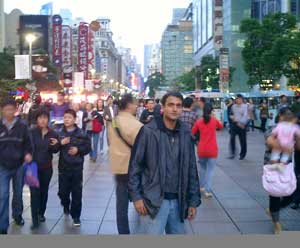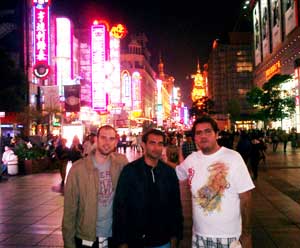Varun - Shanghai - Urban Planning
|
Varun, urban planning and architecture intern, Shanghai China, summer 2011
Because Varun studied international development, and is now pursuing urban planning, an internship in the booming, intense city of Shanghai made sense educationally and personally. “I’d traveled in Asia a lot,” he says, “But Shanghai has a whole different energy and atmosphere. It’s incredibly international and cosmopolitan, it’s experiencing explosive growth, and the people who live and work there are incredibly active and driven.” So Varun found himself in China, sharing an apartment with 3 other interns and working at the Shanghai offices of an international, London-based architecture, design and urban planning firm. There, Varun worked alongside architects, mostly conducting crucial pre-design research. “Urban planning requires a lot of background work. You need to really know the area, its history, its needs, its climate and natural quirks, its laws, its technology – everything.” Varun’s director would often assign him projects and provide the necessary materials, then guide Varun during his research. “It was kind of like taking a private, on-the-job course.” Although his roommates had to wear suits and ties to work, the dress code at Varun’s office was relatively casual. “I was working with architects. They hardly ever dress up.” Varun usually wore jeans and a shirt. His boss also wore “jeans and a shirt, but much more expensive jeans and a much fancier shirt.” he laughs.
Language barriers posed additional challenges. “I was unprepared for how few people really spoke English. At work, my boss and some of the architects spoke English, but a lot of the other workers didn’t.” On the streets, some Mandarin was necessary, and today, Varun’s advice to prospective Shanghai interns is to learn at least common, key phrases before they go. “It was sometimes frustrating not to be able to make myself understood. So, definitely, it’d be better to know some Mandarin.” If he could do another Shanghai internship, Varun says he’d stay longer, explore even more of the city, and learn more of the language. “More” would also apply if he could re-do his shopping excursions. So would he advise prospective interns bring an extra suitcase for all the things they acquire in Shanghai? “That is exactly right!” Varun laughs heartily in a way you know must have pleased the local boutique owners and shop keepers. |
 Varun went to UCLA, one of the best schools in the US; he’s well traveled, and has a work history to boot. Still, he wanted an additional hook as he applied to grad schools – and chose an internship in China to boost his resume. Few things will set your application apart in the way that an internship abroad does. Employers and admission committees know it takes maturity, dedication and some risk-taking to travel to the other side of the world for work, the very qualities they’re looking for.
Varun went to UCLA, one of the best schools in the US; he’s well traveled, and has a work history to boot. Still, he wanted an additional hook as he applied to grad schools – and chose an internship in China to boost his resume. Few things will set your application apart in the way that an internship abroad does. Employers and admission committees know it takes maturity, dedication and some risk-taking to travel to the other side of the world for work, the very qualities they’re looking for. After work and on weekends, Varun explored the city, its old and new areas, its temples and gardens. One weekend, he and another intern went to Tokyo, since it was only a 3-hour plane ride away. But probably, Varun’s favorite Shanghai afterhours pastime was – shopping. “You should see the amazing stores they have there!” he exclaims, “You can get styles and brands you never see in the States.” Because he had traveled in Asia before, Varun took Shanghai’s eccentricities in stride. But he admits some Europeans and Americans had to really adjust to what is sometimes perceived as local rudeness, and tendency to overcharge tourists. “Some of the foreigners weren’t tough enough when they first got there,” he remembers “They’d get upset if they got cheated out of taxi fare, or that they’d have to barter for a decent price of a tomato.”
After work and on weekends, Varun explored the city, its old and new areas, its temples and gardens. One weekend, he and another intern went to Tokyo, since it was only a 3-hour plane ride away. But probably, Varun’s favorite Shanghai afterhours pastime was – shopping. “You should see the amazing stores they have there!” he exclaims, “You can get styles and brands you never see in the States.” Because he had traveled in Asia before, Varun took Shanghai’s eccentricities in stride. But he admits some Europeans and Americans had to really adjust to what is sometimes perceived as local rudeness, and tendency to overcharge tourists. “Some of the foreigners weren’t tough enough when they first got there,” he remembers “They’d get upset if they got cheated out of taxi fare, or that they’d have to barter for a decent price of a tomato.”
